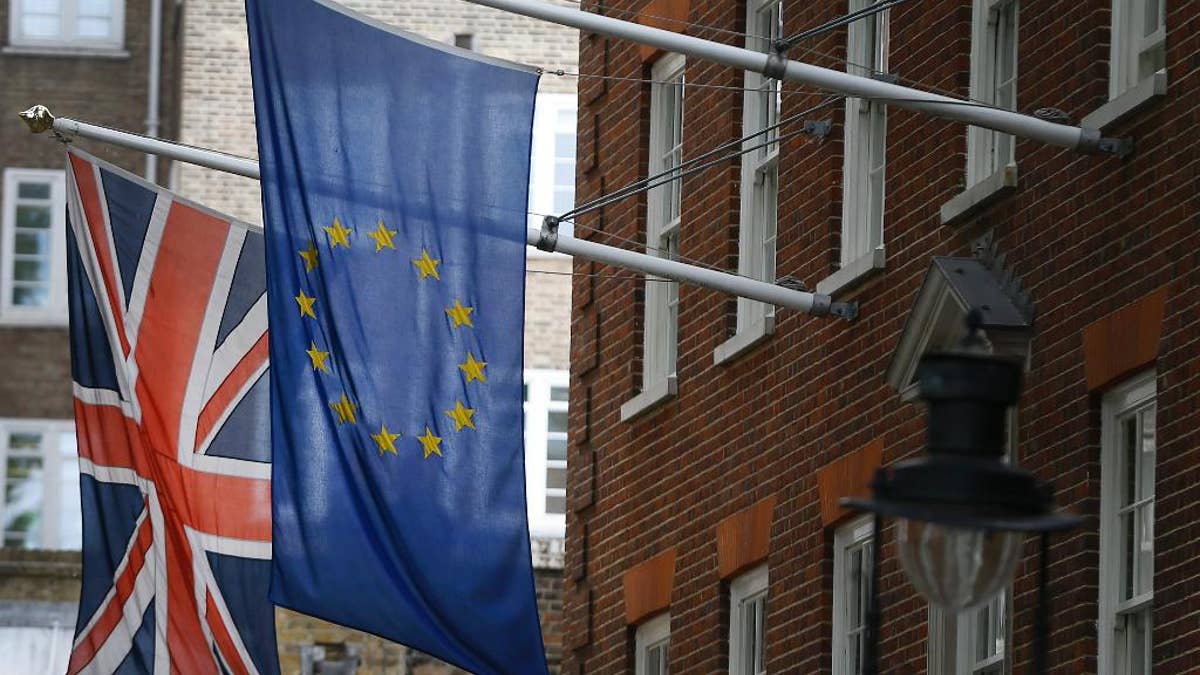
The Union flag and the European Union flag fly outside Europe House, The European Commission Representation in London, Tuesday, June 9, 2015. Prime Minister David Cameron's plan for Britons to vote on whether to leave the European Union faced its first hurdle in Parliament Tuesday, with support from the main opposition but unrest within Conservative ranks. (AP Photo/Kirsty Wigglesworth) (The Associated Press)
The results of the Brexit vote on Friday has been a major shock to markets that don't like uncertainty, hence the big negative market reaction around the world.
There is every prospect that UK trade will decline, output will fall and the Brexit vote will push the UK back into recession.
The polls in the UK got it wrong again as they did a year ago at the general election. Polls over the last week or so had predicted a narrow victory for the Remain side, headed by Prime Minister Cameron, but that wasn't to be.
Markets tanked around the world; the German and French markets were both down on the day by over 6 percent. Oil prices were down 5 percent and price falls were also seen in commodities. The pound plummeted, at one point yesterday dropping from $1.50 to $1.33. European bank stocks were down around 15 percent which is scary. Credit rating agencies also look likely to lower the UK's credit rating.
This feels like a Lehman's moment. Cameron immediately resigned. Political uncertainty is adding to economic uncertainty. The concern now is the Dutch may want to leave and even the Danes, the Swedes and the French. This really is Black Friday.
The Brits have been hurting as the UK economy has been slow to recover from the global financial crisis. This has been the slowest recovery since the South Sea Bubble 300 years ago. Output per head in the UK is only 1 percent above the level it was in 2008. Worker's purchasing power, as measured by their real wages is seven percent below what it was at the start of the Great Recession. There has been a major influx of workers from Eastern Europe; since 2004 more than two million have come to the UK.
A lot of the reason for the Brexit vote were fears about the high levels of immigration. On the day of the vote it was announced that net migration had reached 340,000 despite frequent government promises to reduce these numbers to less than a third of that.
Homeowners though have done OK given that mortgage costs have plummeted. The UK has variable rate mortgages which vary with the interest rate set by the Bank of England most are 150 basis points above Bank Rate. The costs have fallen from around 6.5 percent in 2008 to 2 percent today. London, which voted for Remain, has seen a big rise in home prices. The Brexit vote is likely to cause a big fall in house prices and lead to another recession. The young, who don't own houses, also voted to Remain. Scotland and Northern Ireland both voted for Brexit and are likely now to push for Independence. The United Kingdom isn’t very united.
The worry is that the Brexit vote isn't really about the European Union or even immigration but about globalization -- which isn't going away -- so a post-EU world may be no different.
It is unclear what a post Brexit world will look like, but if, as suggested, it takes the Norwegian model, that allows free movement of workers and so wouldn't slow immigration. Plus, the UK would still have to pay most of the same costs but would no longer be able to influence outcomes.
The EU is not responsible for the decline of English seaside towns once cheap flights meant that holidaymakers could to travel inexpensively to Spain to find the sun.
It is global forces, rather than belonging to the EU, that have resulted in declines in manufacturing and the UK is already one of the least regulated countries in the world.
These are dark days indeed. Who would have thought it? The experts actually.




















